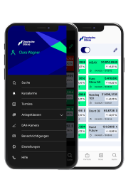Sentiment indicator of Deutsche Börse
Market sentiment

Opinions make markets: Every Wednesday, Deutsche Börse surveys the market expectations of active investors and has the results interpreted in accordance with the findings of the behaviour-oriented capital market analysis, Behavioral Finance. The analysis is published here around 4 pm.
Market sentiment analysis as of January 28, 2026: "Noticeable Relief"
The mood has improved once again compared to the previous week, although it is noticeable that institutional investors have once again withdrawn, but are not yet willing to make any new bullish commitments. They are waiting to see what happens, while at the same time the group of neutral investors has grown to 32 percent of all respondents. Almost the same trend can be observed among active private investors.
While the domestic mood is neutral with a slightly positive note, Joachim Goldberg points to the recent sharp rise of the euro against the dollar as an indication of further capital inflows from abroad, from which the DAX could continue to benefit in the future.
Method

Investors with bullish expectations are long, investors with bearish short. Cost prices and imbalances can be deduced in particular from the changes. Often the sentiment index functions as a counter-indicator because there is no potential demand, but this does not fit in every market situation.
Joachim Goldberg
For more than 30 years, Joachim Goldberg has been dealing with the interaction of people and markets. But it was not until he discovered the psychological influences on the financial markets that the graduate banker and former currency trader thought he had come close to what drives and moves the world of finance.









